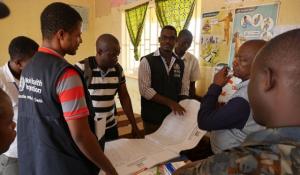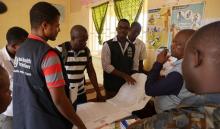From the ground up: rebuilding health systems in the wake of Ebola
As the emergency phase of the response to the Ebola outbreak winds down in Guinea, Liberia and Sierra Leone, the 3 countries face an equally urgent and formidable task: building health systems capable of preventing, detecting and responding to outbreaks.
When Ebola first started spreading in West Africa, the early-warning systems that should have sounded the alarm bell failed to detect the outbreak until it was too late. That allowed the virus to spread rapidly, unhindered by fragile health systems that collapsed under its onslaught.
In Sierra Leone, that early-warning system, called Integrated Disease Surveillance and Response (IDSR), had existed since 2003, but was essentially dormant when Ebola hit. WHO worked with the government to revive it, adapt it for Ebola, and trained health workers across the country to use it. The effectiveness of that system in identifying and responding to cases sooner was a crucial step in helping to blunt the outbreak.
Now WHO is assisting Sierra Leone’s government to expand the system to track 26 priority diseases, including cholera, measles, malaria, typhoid fever as well as women who die in childbirth.
"It's not just about collecting data but making sure there's a response capacity, so we've worked with districts to make sure there is," said Anders Nordstrom, WHO Representative in Sierra Leone.
Read more about rebuilding health systems in the wake of Ebola




